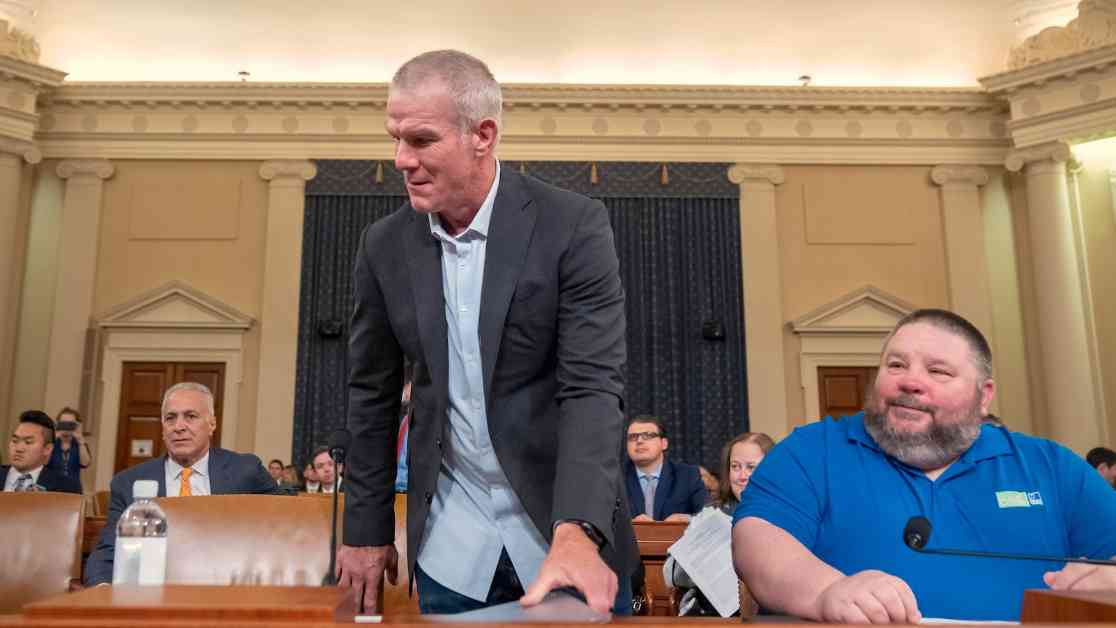Legendary Quarterback Brett Favre Opens Up About Parkinson’s Diagnosis
Legendary quarterback Brett Favre recently revealed that he was diagnosed with Parkinson’s disease earlier this year. The Pro Football Hall of Famer shared this news during an interview with TMZ Sports, explaining that he began experiencing difficulties with his right arm, particularly when trying to hold a screwdriver steady. Favre disclosed his diagnosis as part of his testimony to a congressional committee investigating a welfare misspending scandal in Mississippi.
Noticing the Signs of Parkinson’s
Favre shared that he first suspected something was wrong when his right arm would occasionally get “stuck.” Despite still feeling the strength in his arm, he struggled to control its movements, especially when performing simple tasks like putting on a jacket or holding a screwdriver. This frustration led him to seek medical advice, ultimately resulting in his Parkinson’s diagnosis.
Impact of Head Trauma on Parkinson’s Diagnosis
During his interview with TMZ Sports, Favre mentioned that five Parkinson’s specialists had informed him that head trauma likely played a role in his developing the disease. Given his extensive career in the physically demanding sport of football, Favre acknowledged that he had experienced numerous concussions throughout his playing days. This revelation sheds light on the potential long-term effects of head injuries in athletes.
Favre’s former teammate, Aaron Rodgers, expressed empathy and understanding towards Favre’s situation, recognizing that such health challenges can unfortunately be part of the game. As athletes age, the risks associated with their chosen profession become more apparent, highlighting the importance of prioritizing health and well-being both during and after their careers.
Despite facing this health setback, Favre has not shied away from addressing his involvement in a welfare misspending scandal in Mississippi. While he has repaid a portion of the funds received from speaking engagements related to the case, Favre also disclosed his ties to a biotech company working on concussion treatments. This connection underscores his ongoing commitment to advancing research and treatment options for sports-related injuries.
Throughout his illustrious career, Favre was known for his resilience and durability on the football field. With a record-setting streak of 297 consecutive starts (or 321 including playoff games), he solidified his place in NFL history as one of the most dependable and talented quarterbacks of his era. His MVP awards and Super Bowl victories with the Green Bay Packers further cemented his legacy as a true icon of the sport.
From Green Bay to New York to Minnesota, Favre’s impact on the NFL transcended team loyalties and geographical boundaries. His journey from a young quarterback with the Atlanta Falcons to a seasoned veteran with the Minnesota Vikings showcased his adaptability and competitive spirit. Despite the challenges he now faces with Parkinson’s disease, Favre’s resilience and determination continue to inspire fans and fellow athletes alike.
As Favre navigates this new chapter in his life, he remains focused on raising awareness about Parkinson’s disease and advocating for improved treatment options. By sharing his personal journey with the public, he hopes to shed light on the realities of living with a neurodegenerative condition and encourage others to prioritize their health and well-being. Favre’s courage and openness serve as a reminder that even in the face of adversity, one can find strength and purpose in sharing their story with others.
In conclusion, Brett Favre’s revelation about his Parkinson’s diagnosis serves as a poignant reminder of the fragility of health and the importance of addressing potential health challenges proactively. As he continues to navigate this new reality, Favre’s resilience and determination are a testament to his enduring legacy both on and off the football field. His willingness to share his journey with the world reflects his commitment to raising awareness and advocating for those affected by Parkinson’s disease.








